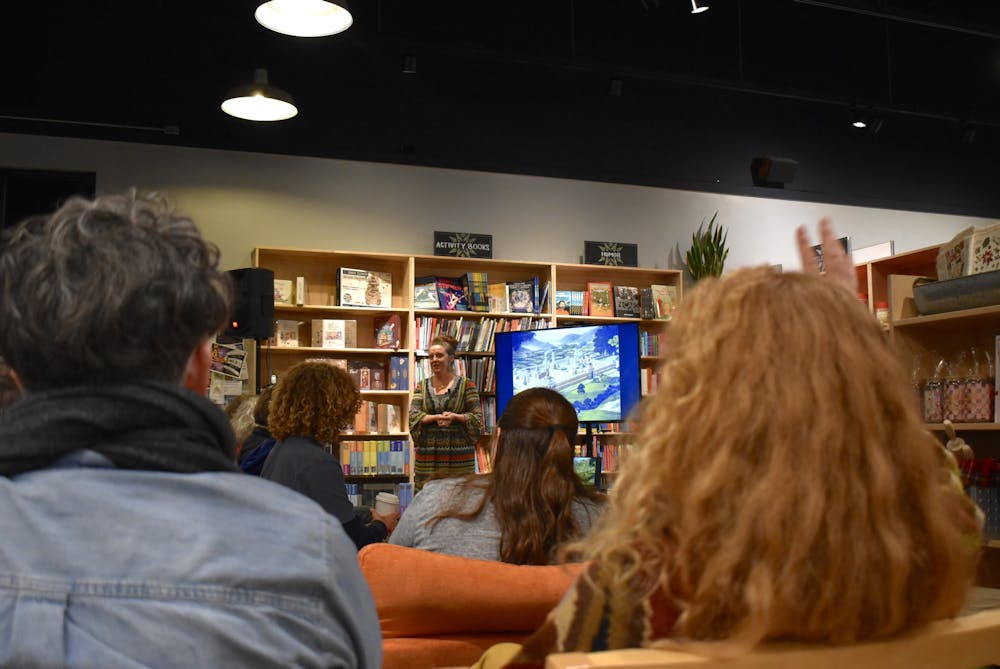The smell of espresso and spines of books, old and new, surrounded Bloomington residents as they filtered in through Morgenstern’s Bookstore and Café’s doors. Novelist Tristra Newyear (T. Newyear) waved to the 30 plus friends and strangers as they sat down to listen to her discuss the launching of her recently released book “Starfall.”
Her sci-fi novel is considered historical fiction because it draws inspiration from New Harmony, Indiana, a small town and failed utopian society founded in the early 1800s.
Standing in front of her powerpoint slideshow, Newyear began the talk with a description of the town. New Harmony was founded by Robert Owen, a utopian socialist which Newyear took an interest in, along with other residents of the historical society.
Newyear said she found it important to write about people’s stories who hadn’t been properly reported on before, especially women of the past who had been overlooked.
While talking about the town, it came as no surprise Newyear studied the history of the society for six to seven years. She gave detailed descriptions of the lifestyles these people lived, specifically mentioning the importance of the letters they wrote.
“Most of how you know people of the past, is through how they wrote,” she said.
The society she studied ended up failing due to consistent disputes between the town's residents. Throughout her presentation, Newyear asked the question, “Is a utopian society possible?” She followed up with the rhetorical question, “Why did utopia seem possible?” and “Why is dystopia the vibe of our times?”
Her newly published book, “Starfall,” nods to these topics, focusing on main character Xenia who has an integrated artificial intelligence. She comes across a strange town which has a long utopian history, a nod to New Harmony.
Towards the end of her presentation, Newyear said society has to learn how to work on solutions to problems together, rather than separately.
“The only way we’re going to get through is together, there are no individual solutions right now,” she said.
Mitch Teplitsky has been the marketing director for Morgenstern’s since it reopened in 2021. He had interviewed Newyear prior to the event and explained his admiration for the wit and energy in her writing.
“This is one of those events where I usually feel pretty confident they’ll go fine,” he said.
He also shared the ways Morgenstern’s has been able to create a space of unity. As the event started, those who came to gather at the event settled into their chairs. Some decided to get coffee at 6:30 p.m., others settled for a glass of wine.
Amongst the crowd, a couple of friends, Laura Weaver and Amy Jackson, sat near the back. They were in an a cappella group with Newyear named “Kaia,” which was around for 14 years in Bloomington until 2018, and have stayed close ever since. They came to Morgensterns to show their support and commented on Newyear’s constant perseverance with her studies throughout college, which have carried on into her writing career. Weaver said she was impressed with the amount of research put into her book.
“She’s one of the most brilliant people we know,” Jackson said.
Chris Elam was the designer for the book's cover, which is a labyrinth, inspired by the sculpted hedge mazes of New Harmony. He said events like this feel important because they allow authors like Newyear to promote their work, something that can be difficult for local artists.
Morgenstern’s event coordinator, Matthew Woods, said celebrating art as a community is something that brings people together, which Morgenstern’s strives to do. Woods said he finds Newyear’s book interesting becuase it is based in real research on a community that existed.
“Books like this and conversations like this are important because the local author aspect is really great,” he said.
Woods said Newyear’s integration in the community allows for people to connect with her writing more. Specifically, he shared his appreciation for books’ abilities to provide connections for people of all backgrounds since they find things to talk about with each other.
The question of whether or not a utopian society can be reached was never answered, however, the crowd continued its conversation with one another, brewing not with perfection but rather with connections and comfortability.




